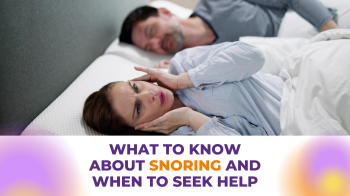Here’s what you need to know about snoring and when to seek help
 Snoring is an annoying and all too common occurrence. People often dismiss snoring as just a nightly nuisance. But sometimes, snoring can indicate an underlying health issue, like sleep apnea.
Snoring is an annoying and all too common occurrence. People often dismiss snoring as just a nightly nuisance. But sometimes, snoring can indicate an underlying health issue, like sleep apnea.
Several factors contribute to snoring, and certain indicators point to snoring being cause for concern. So let’s talk more about what snoring is, why it happens, and when you should talk to a healthcare professional.
The anatomy of a snore
First things first, what exactly is snoring?
Snoring is the unpleasant sound produced when the airflow through the passages at the back of the mouth and nose is partially blocked. Snoring can affect people of all ages, including children. However, snoring most commonly occurs among older adults and people who are overweight.
Here’s a breakdown of the anatomy involved in snoring:
Mouth and nose: The most common cause of snoring originates in the mouth and nose. When you sleep, the muscles in these areas relax, causing the air passages to narrow.
Soft palate and uvula: The soft palate and uvula are located at the back of the roof of the mouth. If these structures relax too much during sleep, they can partially block the airflow, leading to snoring.
Tongue: If the tongue falls backward into the throat during sleep, it can obstruct the airway and create snoring sounds.
Tonsils and adenoids: Enlarged tonsils and adenoids, especially in children, can also contribute to snoring. These lymphoid tissues are located at the back of the throat and can obstruct the airway.
Nasal passages: Congestion or blockage in the nasal passages due to conditions like nasal polyps, a deviated septum, or allergies can force mouth-breathing, which increases the likelihood of snoring.
Throat muscles: As you fall asleep, your throat muscles, including the pharyngeal muscles, relax. This relaxation can lead to a narrowing of the airway, making snoring more likely to occur.
Epiglottis: This is the flap-like structure located at the base of your tongue. Its primary role is to prevent food from entering the windpipe. But it can also contribute to snoring if it collapses and obstructs the airway during sleep.
Hyoid bone: This U-shaped bone located in the neck supports the tongue and other muscles. Changes in the hyoid bone’s position during sleep can influence the likelihood of snoring.
Why do people snore?
Several factors can cause a person to snore, and these factors often interact with each other. Some of the most common reasons why people snore include the following:
Relaxation of muscles: As previously discussed, when you sleep, the muscles in your body, including those in your throat and mouth, relax. This relaxation causes the airway to narrow airway, which can make snoring occur.
Positional factors: The position you sleep in matters. Sleeping on your back can cause the tongue and soft palate to collapse to the back of the throat, partially blocking the airway and resulting in snoring. Some people may snore only when sleeping in specific positions.
Tissues and anatomy: The physical structure of the mouth and throat, including the size of the uvula and soft palate, can contribute to snoring. Enlarged tonsils or adenoids, as well as nasal congestion, may also play a role.
Age: As people age, muscle tone tends to decrease, including the muscles in the throat. The loss of muscle tone can contribute to the relaxation and collapse of the airway tissues during sleep, leading to snoring.
Weight: Overweight people are more prone to snoring. Excess weight, especially around the neck, can put pressure on the airway and contribute to its narrowing during sleep.
Alcohol and sedatives: The use of alcohol and sedative medications can relax the muscles in the throat, making snoring more likely. These substances contribute to increased muscle relaxation and may worsen snoring.
Nasal congestion: Conditions that cause nasal congestion, such as allergies, sinus infections, or a deviated septum, can force mouth-breathing, which increases the chances of snoring.
Genetics: In some cases, people may have a genetic predisposition to snoring. Certain anatomical features inherited from family members may contribute to an increased likelihood of snoring.
When to worry about snoring
Occasional snoring is common and not necessarily a cause for concern. However, there are instances when snoring may indicate an underlying health concern and should be evaluated by a healthcare professional.
Here are some signs that you should seek medical attention for snoring:
Chronic, loud snoring: If your snoring is loud and disruptive, especially to the point where it disturbs your or your bed partner’s sleep, it may be a cause for concern.
Witnessed pauses in breathing: If someone observes that you experience pauses in breathing during sleep, it could indicate a more serious condition known as sleep apnea.
Excessive daytime sleepiness: Chronic snoring, especially if it’s associated with sleep apnea, can lead to poor sleep quality. This may result in excessive daytime sleepiness and difficulty concentrating.
Gasping or choking sounds: Gasping or choking sounds during sleep are red flags for sleep apnea. These sounds often accompany pauses in breathing and can be alarming.
Frequent awakenings during the night: If you find yourself waking up frequently during the night and having trouble falling back asleep, it could be a sign of an underlying sleep disorder.
Morning headaches: People with sleep apnea may experience morning headaches due to a decrease in oxygen levels during episodes of interrupted breathing.
High blood pressure: Persistent snoring, especially if associated with sleep apnea, can contribute to the development or worsening of high blood pressure.
Obesity or weight gain: Excess weight, especially around the neck, can cause the airway to narrow and increase the risk of snoring. If snoring becomes a concern, addressing weight management may be beneficial.
Partner observations: If your sleep partner notices any concerning patterns, such as irregular breathing, long pauses, or unusual movements during your sleep, it’s worth discussing with a healthcare professional.
After talking to a healthcare provider or sleep specialist, they can conduct a thorough evaluation, which may include a sleep study (polysomnography), to diagnose your snoring’s underlying cause and determine the appropriate course of action. In some cases, lifestyle modifications, positional therapy, or medical interventions may be recommended to address snoring and any associated sleep issues.
Dr. Meghna Dassani has practiced dentistry for over two decades and is passionate about the role dentists play in whole-body health. You can learn more at her website: MeghnaDassani.com.
Healthy Sleep Revolution Podcast
Snoring? Tired all day? Trouble focusing?
So many think these symptoms are common in kids and adults when tired. Join us as we debunk some of these common myths and put the spotlight on Sleep Apnea. Discover what constitutes healthy sleep and how we can help ourselves and our kids get the best sleep ever.


